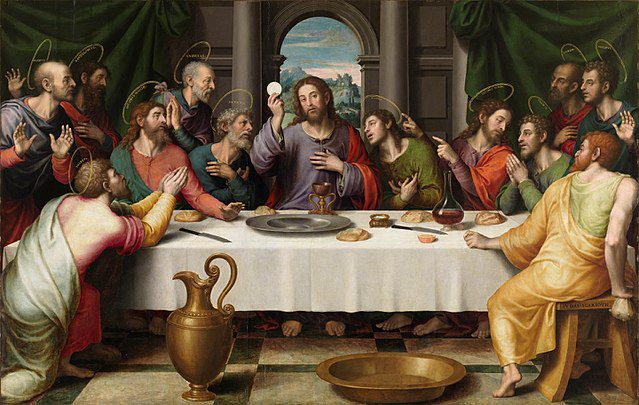Phenomenological Language in Holy Scripture and in the Addresses of Pope Francis

In an article hosted by Gloria.tv (6-24-19), it was stated:
The Eucharist is “Jesus who becomes bread,” and contains the “entire reality of the Church,” Pope Francis claimed in his June 23 Corpus Christi homily.
He went on alleging that we find in the Eucharist God himself “contained in a piece of bread.” These formulations are profoundly heretical. . . .
The heretical concept pronounced by Francis is called “impanation.” It denies transubstantiation and is usually explained with the wrong statement that “God has become bread.” Transsubstantiation [sic] is the changing of the bread’s substance into the substance of Christ’s body effectuated by the consecration during Mass.
The sedevacantist website, Novus Ordo Watch followed suit (on 6-23-19), even tossing in a dig at yours truly:
Bergoglio’s sermon for Corpus Christi did not just have the wrong emphasis, it was explicitly heretical. . . .
Any child who wants to make his First Holy Communion would not be admitted if this were his understanding of the Eucharist. It is heresy!
The only correct understanding of what happens to the bread and wine when they are consecrated by a priest during Holy Mass is the dogma of Transubstantiation, nothing else. What Bergoglio puts forward in today’s homily is, at best, the Lutheran heresy of Consubstantiation, also called Impanation, . . .
Of course there will not be lacking now Novus Ordo apologists who will try to argue that Francis didn’t mean what he said in a heretical sense. But at this point, only a fool would still be swayed by the constant hermeneutical acrobatics that people like Tim Staples, Jimmy Akin, or Dave Armstrong come up with . . .
It’s not as if Francis were somehow incapable of speaking clearly and in an orthodox fashion. A man who constantly speaks in such a way that heresy is easily and naturally understood from his words, and does not lift a finger to do anything about it — one, in fact, who continually pushes the envelope further and further –, is quite clearly a heretic.
Here are the relevant highlights of the homily in question, from Zenit:
In the presence of the Eucharist, Jesus who becomes bread, this simple bread that contains the entire reality of the Church, . . .
The Eucharist teaches us this: for there we find God himself contained in a piece of bread.
[Y]ou have the Eucharist, bread for the journey, the bread of Jesus. Tonight too, we will be nourished by his body given up for us.
The jaded interpretation of his words seen in the two (reactionary and sedevacantist) articles above is refuted in Pope Francis’ Angelus Address on the same day (Feast of Corpus Christi):
This miracle — very important, so much so that it is recounted by all the Evangelists — manifests the Messiah’s power and, at the same time, His compassion: Jesus has compassion for the people. That prodigious gesture not only remains as one of the great signs of Jesus’ public life, but it anticipates what would later be, at the end, the memorial of His sacrifice, namely, the Eucharist, Sacrament of the His Body and of His Blood given for the salvation of the world. . . .
The feast of Corpus Domini invites us every year to renew the wonder and joy for this stupendous gift of the Lord, which is the Eucharist. Let us receive it with gratitude, not in a passive, habitual way. We must not get used to the Eucharist and go to Communion out of habit: no! Every time we approach the altar to receive the Eucharist, we must truly renew our “Amen” to the Body of Christ. When the priest says to us “the Body of Christ,” we say “Amen,” but it must be an “Amen” that comes from the heart, with conviction. It is Jesus, it is Jesus who has saved me; it is Jesus who comes to give me the strength to live. It is Jesus, Jesus alive, but we must not get used to it: it must be every time as if it were our First Communion. . . .
May Our Lady help us to follow Jesus with faith and love, whom we adore in the Eucharist.
We know without question that Pope Francis believes in transubstantiation, from many other utterances:
There are other hungers- for love, for immortality for life, for affection, for being cared, for forgiveness, for mercy. This hunger can be satiated only by the bread that comes from above. Jesus himself is the living bread that gives life to the world (cf. Jn 6:51). His body offered for our sake on the cross, his blood shed for the pardon of the sins of humanity is made available to us in the bread and wine to the Eucharist transformed in the consecration.
But the Eucharist does not end with the partaking of the bread and blood of the Lord. It leads us to solidarity with others. The communion with the Lord is necessarily a communion with our fellow brothers and sisters. And therefore the one who is fed and nourished by the very body and blood of Christ cannot remain unaffected when he sees his brothers suffering want and hunger. (Homily for the Feast of Corpus Christi, 5-30-13)
Therefore the Eucharistic Celebration is much more than simple banquet: it is exactly the memorial of Jesus’ Paschal Sacrifice, the mystery at the centre of salvation. “Memorial” does not simply mean a remembrance, a mere memory; it means that every time we celebrate this Sacrament we participate in the mystery of the passion, death and resurrection of Christ. The Eucharist is the summit of God’s saving action: the Lord Jesus, by becoming bread broken for us, pours upon us all of his mercy and his love, so as to renew our hearts, our lives and our way of relating with him and with the brethren. . . . the bread that is the Body of Jesus Christ who saves us, forgives us, unites us to the Father. (General Audience, 2-5-14)
Jesus underlines that he has not come into this world to give something, but to give himself, his life, as nourishment for those who have faith in Him. . . . Every time that we participate in Holy Mass and we are nourished by the Body of Christ, the presence of Jesus and of the Holy Spirit acts in us, shaping our hearts, communicating an interior disposition to us that translates into conduct according to the Gospel. (Angelus for the Feast of Corpus Christi, 6-22-14)
In the Eucharist Jesus does not give just any bread, but the bread of eternal life, he gives Himself, offering Himself to the Father out of love for us. (Angelus, 8-13-14)
The Eucharist is Jesus who gives himself entirely to us. To nourish ourselves with him and abide in him through Holy Communion, if we do it with faith, transforms our life into a gift to God and to our brothers… eating him, we become like him. . . . [the Eucharist] is not a private prayer or a beautiful spiritual experience . . . it is a memorial, namely, a gesture that actualizes and makes present the event of the death and resurrection of Jesus: the bread is truly his Body given, the wine is truly is Blood poured out. (Angelus, 8-16-15; Catholic News Agency)
It’s not just a memory, no, it’s more: It’s making present what happened twenty centuries ago. . . . This is Mass: entering in this Passion, Death, Resurrection, and Ascension of Jesus, and when we go to Mass, it is as if we go to Calvary. Now imagine if we went to Calvary—using our imagination—in that moment, knowing that that man there is Jesus. Would we dare to chit-chat, take pictures, make a little scene? No! Because it’s Jesus! We would surely be in silence, in tears, and in the joy of being saved… Mass is experiencing Calvary, it’s not a show. (General Audience, Crux, 11-22-17)
It continues to be a breathtaking phenomenon, how the dumbfounded, relentless enemies of this pope can’t undertake the slightest labor to simply check and see what the pope believes about a given topic, by doing a search. Is this impossible for them? Have they not heard of the Holy See website and its searching capabilities? Are they unaware of Google? It’s astonishing.
So why does Pope Francis often seem to equate “bread” (after consecration) with Jesus’ Body? He doesn’t say the more precise and literal “what was once bread” or “what has the appearance of bread” or “what continues to have the accidents of bread and wine”. I contend that he’s simply using phenomenological language. We do so all the time by saying, “the sun goes down” or “the sun rises.”
It’s everyday language that refers to appearance rather than essence. We know that He believes in transubstantiation because he refers to partaking of the Body and Blood in several of his homilies and other talks. He combines this orthodox belief with the language of appearance. And so he says, “the bread is truly his Body given, the wine is truly is Blood poured out” (8-16-15).
Is it impermissible (or heretical) to speak in that way? I should think not, seeing that our Lord Jesus and the Gospel writers and St. Paul did so. Jesus still referred to the consecrated and transformed former bread as “bread”:
John 6:50-51, 58 This is the bread which comes down from heaven, that a man may eat of it and not die. [51] I am the living bread which came down from heaven; if any one eats of this bread, he will live for ever; and the bread which I shall give for the life of the world is my flesh.” . . . [58] This is the bread which came down from heaven, not such as the fathers ate and died; he who eats this bread will live for ever.”
The Gospel writers refer to the consecrated / transubstantiated element as “bread” too:
Matthew 26:26 Now as they were eating, Jesus took bread, and blessed, and broke it, and gave it to the disciples and said, “Take, eat; this is my body.”
Mark 14:22 And as they were eating, he took bread, and blessed, and broke it, and gave it to them, and said, “Take; this is my body.”
Luke 22:19 And he took bread, and when he had given thanks he broke it and gave it to them, saying, “This is my body which is given for you. Do this in remembrance of me.”
Here is St. Paul doing the same thing:
1 Corinthians 10:16-17 . . . The bread which we break, is it not a participation in the body of Christ? [17] Because there is one bread, we who are many are one body, for we all partake of the one bread.
1 Corinthians 11:23-29 For I received from the Lord what I also delivered to you, that the Lord Jesus on the night when he was betrayed took bread, [24] and when he had given thanks, he broke it, and said, “This is my body which is for you. Do this in remembrance of me.” [25] In the same way also the cup, after supper, saying, “This cup is the new covenant in my blood. Do this, as often as you drink it, in remembrance of me.” [26] For as often as you eat this bread and drink the cup, you proclaim the Lord’s death until he comes. [27] Whoever, therefore, eats the bread or drinks the cup of the Lord in an unworthy manner will be guilty of profaning the body and blood of the Lord. [28] Let a man examine himself, and so eat of the bread and drink of the cup. [29] For any one who eats and drinks without discerning the body eats and drinks judgment upon himself.
Thus, Pope Francis is using the language of Jesus, Paul, Matthew, Mark, and Luke. If he is wrong and is supposedly a eucharistic heretic, so are they. Since that is ridiculous, the accusation collapses in a heap.
Pope Leo XIII, in Providentissimus Deus (18 Nov. 1893) stated:
Ordinary speech primarily and properly describes what comes under the senses; and somewhat in the same way the sacred writers-as the Angelic Doctor also reminds us – “went by what sensibly appeared,” or put down what God, speaking to men, signified, in the way men could understand and were accustomed to.
Or we could cite the Pontifical Biblical Commission, “Concerning the Historical Character of the First Three Chapters of Genesis” (30 June 1909):
V: Must each and every word and phrase occurring in the aforesaid chapters always and necessarily be understood in its literal sense, so that it is never lawful to deviate from it, even when it appears obvious that the diction is employed in an applied sense, either metaphorical or anthropomorphical, and either reason forbids the retention or necessity imposes the abandonment of the literal sense? Answer: In the negative.
It’s not as though Pope Francis was the only one, either (besides Bible writers and Jesus) to ever do this. For example, Pope St. John Paul II, in his encyclical letter Ecclesia de Eucharistia (4-17-03), referred to “Eucharistic Bread” twice (18, 21), and “consecrated bread and wine” (59). He also cited three examples of Church fathers writing in similar fashion:
For what is the bread? It is the body of Christ. And what do those who receive it become? The Body of Christ – not many bodies but one body. For as bread is completely one, though made of up many grains of wheat, and these, albeit unseen, remain nonetheless present, in such a way that their difference is not apparent since they have been made a perfect whole, so too are we mutually joined to one another and together united with Christ (St. John Chrysostom, sec. 23 in the encyclical)
Do not see – Saint Cyril of Jerusalem exhorts – in the bread and wine merely natural elements, because the Lord has expressly said that they are his body and his blood: faith assures you of this, though your senses suggest otherwise. (St. Cyril of Jerusalem, sec. 15)
He called the bread his living body and he filled it with himself and his Spirit. (St. Ephrem, 17)
The same pope referred to the “bread of salvation” (6-10-04, on the Feast of Corpus Christi). Pope Benedict XVI mentioned the “Eucharistic Bread” (12-22-05).
Pope Leo XIII, in his encyclical Quod Anniversarius (1 April 1888) observed:
As to the faithful, We strenuously exhort them after Sacramental confession devoutly to partake of the Bread of Angels for the benefit of the souls in purgatory.
Ven. Pope Pius XII, in his encyclical Mystici Corporis Christi (29 June 1943), wrote:
Through Holy Orders men are set aside and consecrated to God, to offer the Sacrifice of the Eucharistic Victim, to nourish the flock of the faithful with the Bread of Angels and the food of doctrine, to guide them in the way of God’s commandments and counsels and to strengthen them with all other supernatural helps. (20)
Likewise, Pope Pius XI, in his encyclical Ad Catholici Sacerdotii (20 Dec. 1935):
Then, as soon as he is able to recognize and value the Bread of Angels, the priest gives It to him, the living and life-giving Food come down from Heaven.
Many more examples could surely be found, but my point is more than adequately established by now.
Here’s another angle on it, though: Jesus was omniscient, and so He knew that in 2019, there would be sedevacantist and reactionary extremists making out that Pope Francis denied transubstantiation because he used the same sort of language that He, the Apostle Paul, and the evangelists had used, as recorded in inspired revelation. And indeed, Protestants (and atheists) could have and have in fact made the same sorts of arguments against transubstantiation, by noting that the Bible refers to consecrated bread as still “bread.”
But He didn’t change the way He talked. He didn’t speak like a Thomist or systematic theologian. But His words and that of the others in the Bible are just as likely to be misunderstood as Pope Francis’ identical language has been. He didn’t consider that enough reason to use different language Himself, or to bring about different language used by the other Scripture writers and apostles.
Case closed. What’s good enough for Jesus is good enough for me, and for Pope Francis, and it should be for anyone else who professes the Catholic faith.
If these extremist critics would think and research just a little bit before they make their usual lightning-quick accusations of heresy (and/or sheer theological incompetence) against the Holy Father, these silly disputes would not have to waste any of our time at all. But since they so often don’t, we apologists (who still believe in honoring popes and defending them against scurrilous accusations) are here to help the faithful understand how ludicrous are a vast number of accusations against Pope Francis. Happy to help . . .
***
Photo credit: The Last Supper (c. 1562), by Juan de Juanes (c. 1507-1579) [public domain / Wikimedia Commons]
***












